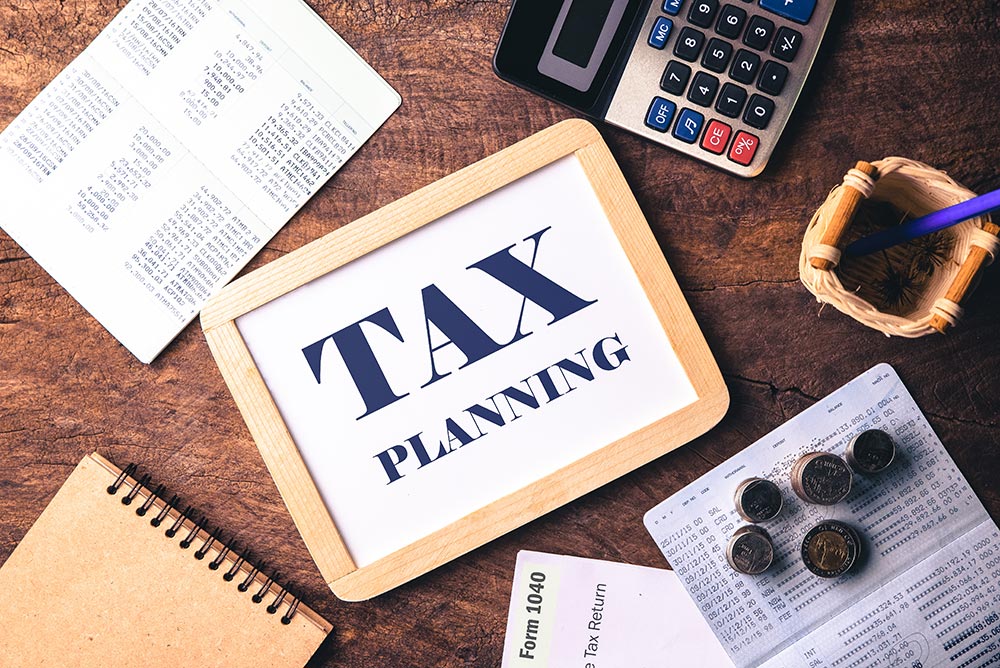Getting an unexpected tax bill can be more than just a disappointment. It can also derail your financial plans and hinder your ability to achieve your financial goals. You can’t change what happened the previous tax year, but you can take steps to prepare for the next tax year. How you plan and file your taxes can have a tremendous impact on how much you owe. The U.S. tax code is incredibly complex. And if you’re not familiar with every part of it, you could be missing out on some opportunities.
Tax planning is about more than just compliance. It’s about coming up with a tax strategy that will align with your long-term financial goals. Part of this process involves a thorough analysis of your financial situation, which is followed by the development of a tailored plan that will minimize your tax liability (all while maximizing your returns).

Steps Involved in Tax Planning
The specific steps in a good tax planning strategy will include the following:
- Planning — Doing a proactive review of your current tax position, so potential savings opportunities can be identified.
- Implementation — Finding available legal strategies that will maximize your tax savings potential.
- Execution — Offering guidance on the steps involved in the chosen strategy, so you can be prepared for future tax seasons.
- Preparation — Making a calculation of your final tax payment while making sure everything is accurate and compliant with current tax codes.
If you want to avoid any tax penalties, you need to stay in compliance with local tax regulations. That’s why hiring a professional for your income tax planning is so important.
The Benefits of Hiring a Professional for Income Tax Planning
It’s the goal of any business or individual to maintain a steady stream of income while keeping expenses to a minimum. A professional tax planning and consulting firm can help you to make sure you’re able to stay financially stable, so you can focus on maximizing your income without having to worry about any unexpected tax liabilities.
Here are some of the reasons why you should hire a professional for income tax planning:
- You’ll be able to maximize your tax deductions — Hiring a professional tax planner can help you save more money by making sure you take advantage of all available tax credits and incentives. You will also be able to maximize your profitability while being transparent with the IRS.
- You’ll reduce the risk of errors — Hiring a tax expert will not only minimize your chances of making errors on your tax return but can also reduce the likelihood of you being audited by the IRS. Filing taxes can be a tedious and complicated process, so it’s a good idea to have CPA that can make sure you have all the relevant information.
- You can avoid any legal consequences — Having any errors on your tax return can result in serious legal consequences, which is why you need to make sure all of the financial information you report is true and accurate to the best of your knowledge. A professional tax planner will make sure all of your documents are free from mistakes.
The goal of a tax planner is to help you come up with the best strategy for taking advantage of all the benefits and deductions for which you can qualify. Tax professionals can look at your current financial situation and come up with a strategic plan that will minimize any current and future tax liabilities while also maximizing your financial returns.
The right income tax planning strategy should consider your long-term financial goals. It must also consider any of the following:
- Your age.
- Any expenses you may have in the future.
- Your marital status.
- Whether you have any dependents.
- Any assets you own.
- Whether you own a business.
For most taxpayers, combining different strategies will generate the best results. And there are many ways to approach it. It’s just a matter of knowing which strategies need to be applied and how they should be implemented. This is where CPAs can make a difference. They will have a great deal of knowledge of current tax codes, so they can advise their clients on the potential legal consequences of making certain financial decisions. CPAs can guide their clients into getting the most out of their taxes while staying in compliance with current tax codes.
Annual Tax Planning FAQ
The word “tax planning” refers to the process of arranging your financial affairs in a way that allows you to take advantage of provisions in the tax laws that can reduce your tax liability. The goal of a tax planner is to maximize the use of tax breaks that you might be eligible for, which can result in a substantial amount of tax savings that can extend beyond a single tax year.
Here are some common questions people ask about tax planning.
Tax planning services can be approached in several different ways. Some of them include the following:
Short-Term Tax Planning — This type of tax planning is done at the end of a specific income year, and its goal is to legally reduce your taxable income.
Long-Term Tax Planning — This type of tax planning is done at the start of the income year, and its goal is to come up with a strategy that can be implemented over the course of several years. It won’t pay off immediately, but it will most likely help you over the long term.
Permissive Tax Planning — The purpose of this type of tax planning is to take advantage of various incentives and tax deductions.
Purposive Tax Planning — This type of tax planning has a specific purpose to make sure you can take advantage of the maximum amount of tax benefits. It’s often done by getting into the right investments and replacement of assets. It can even involve changing your residential status, as well as diversifying your business activities and income.
Be sure to speak to a professional tax planner for more information.
Tax preparation takes a reactive approach, because you can’t change what happened the previous year. So, any opportunities you could have taken advantage of to reduce your tax liability will be gone. All you can do is wait for your tax documents (such as 1099s and W-2s) to arrive, so you can hand them over to your tax preparer by the April 15th deadline. With tax planning, you’re taking a proactive approach by focusing on what’s happening now and in the future.
Tax planning is often seen as a benefit of which only wealthy taxpayers can tax advantage, but even low-income taxpayers can benefit from it because it’s not just about how much you make. It’s about how much you get to keep, which is something that independent contractors and freelancers will discover.
It can help them stay ahead and implement certain practices that are more financially sound (such as keeping track of their earnings and paying the quarterly estimated tax payments). That way, they won’t be surprised when it’s time to file their taxes.
Investing in tax planning to avoid or put off paying taxes until later will give you more discretionary money that you can spend or invest. A good tax planning strategy will allow you to take advantage of as many tax breaks as possible. It works within the current tax laws to maximize allowable deductions and credits.
Some of the people who can benefit from tax planning can include the following:
Business Owners — If you’re a business owner, you can implement a tax planning strategy with the right entity selection because it can significantly affect your taxes.
Real Estate Investors — Real estate can be your primary or secondary source of income, but a good tax planning strategy will involve finding ways to hold your properties and work them to your advantage.
Long-Term Investors — If you’re a long-term investor, a good tax planning strategy will involve finding advantaged investments. In this case, it’s all about how you structure your portfolio.
Be sure to speak to a tax professional for more information.
The best time to start a tax planning strategy is at the beginning of the fiscal year, but it’s never too late to benefit from these services. Proper planning throughout the year will allow you to make adjustments, so you can take advantage of every available opportunity and avoid last-minute surprises.
If you’re looking for a CPA in Corpus Christi that can help you with a solid tax planning strategy, be sure to get in touch with Jennings, Hawley & Co., P.C. We have an experienced team who would be happy to speak with you!
